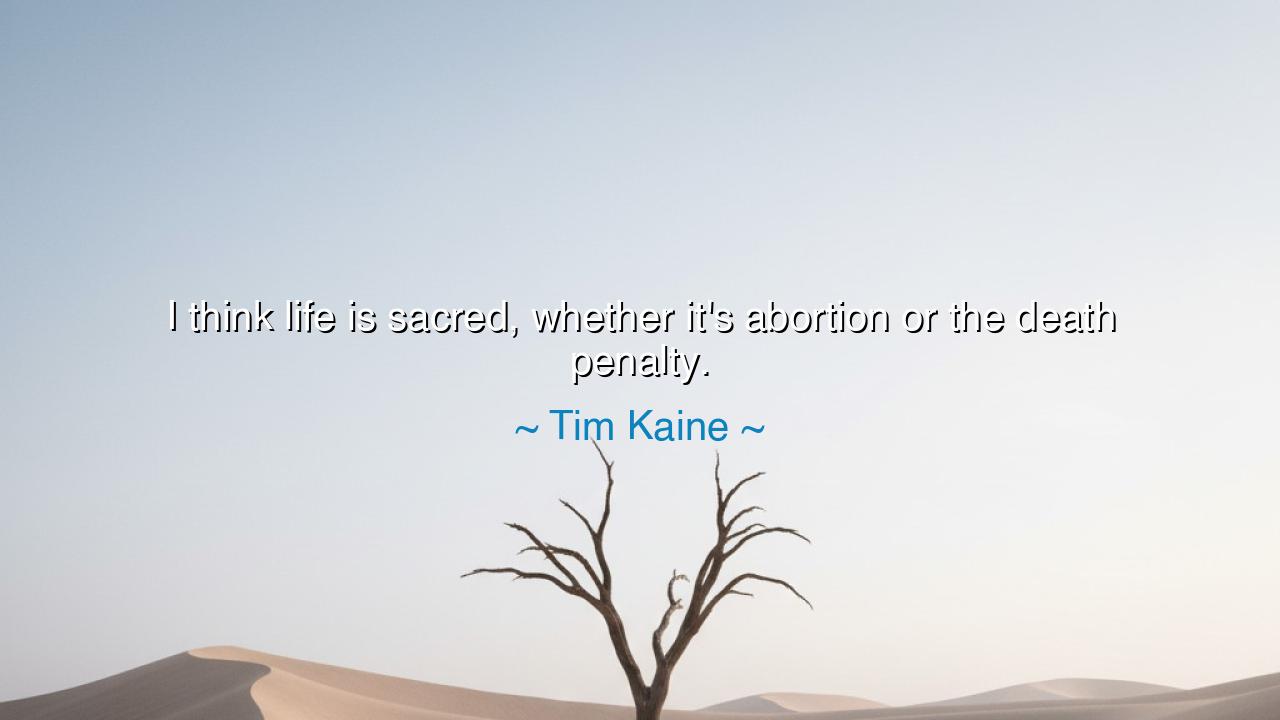
I think life is sacred, whether it's abortion or the death






The words of Tim Kaine, when he said, “I think life is sacred, whether it’s abortion or the death penalty,” carry the tone of one who seeks to reconcile the deepest paradox of human morality — the tension between justice and compassion, between the sanctity of life and the complexities of choice. His statement, simple yet profound, emerges not as a political stance, but as a moral meditation on the universal value of existence. In this saying, Kaine speaks with the voice of one who has stood in the space between belief and responsibility, where ethics are not written in stone but carved upon the heart.
To say that life is sacred is to echo the wisdom of every age and civilization. The ancients, whether they called their gods by Greek, Hindu, or Hebrew names, shared one reverence: that life — fragile, mysterious, fleeting — was a flame borrowed from the divine. To extinguish it was to trespass upon the will of the heavens. Yet the same societies often wielded the sword of justice, taking life in the name of order or vengeance. Thus, since the dawn of nations, mankind has wrestled with this question: how can one uphold the sanctity of life while sanctioning death? Kaine’s words call us to return to that old struggle — not to solve it, but to face it honestly, humbly, and with open hearts.
He speaks of both abortion and the death penalty, two realms where the question of life and choice meet in their most painful forms. In the first, it is the question of beginnings — of potential life weighed against freedom, circumstance, and survival. In the second, it is the question of endings — of justice weighed against mercy, of punishment against forgiveness. Kaine’s statement is not the voice of condemnation, but of consistency. He invites us to look beyond the lines that divide ideology and see a single truth: that life, in all its forms, deserves reverence, even when our world demands impossible choices.
In the stories of old, there were those who bore this same burden of conscience. Consider Marcus Aurelius, emperor and philosopher, who held the power to command death with a word, yet wrote in his Meditations that all life is bound by the same breath of nature — that to destroy another is to destroy a part of oneself. His power did not blind him to humility. He knew that to govern wisely was to remember that each soul, no matter how lowly or fallen, was touched by the same light that kindles the stars. Kaine’s reflection springs from that same awareness — that sacredness does not discriminate between the innocent and the guilty, the unborn and the condemned. It is a fire that burns equally in all.
In a world where politics often divides and hardens the heart, to say that life is sacred in every circumstance is an act of courage. It demands that we hold both compassion and accountability, that we look upon the sinner and the saint with the same quiet awe. Kaine’s words remind us that morality is not a weapon to wield, but a mirror in which we must see ourselves — flawed, uncertain, and yet capable of grace. For when we defend life only where it suits us, we do not serve truth; we serve convenience. But when we revere it everywhere, even where it challenges us, we begin to walk the path of wisdom.
This truth extends beyond law and faith. It calls to every human soul, saying: Do not measure the worth of life by circumstance. A child in the womb, a prisoner on death row, a stranger on the street — all are bound by the same fragile thread. To see that thread and honor it is to participate in the sacred order of creation. The ancients called it ahimsa, the principle of non-harm; the mystics called it divine compassion. It is the same truth that beats at the heart of Kaine’s words: that every breath, no matter how frail or flawed, carries something holy.
So let this be the lesson for all generations: to cherish life, not selectively, but wholly. To stand for life is not to escape the complexity of the world, but to enter it with reverence and humility. When faced with the choice to judge, pause and remember the sacredness of the soul before you. When tempted to condemn, recall that mercy, too, is a form of justice. For as Kaine teaches, the true strength of humanity lies not in our ability to take life, but in our courage to protect it — in our willingness to see the divine even in the most fragile forms of being.
Thus, to believe that life is sacred is not to cling to dogma, but to awaken to a universal truth — that every heartbeat, from the cradle to the gallows, is a miracle. And those who honor that truth walk in the path of the ancients, bearing not the sword, but the light of understanding — a light that shines, eternal and unbroken, upon all who live.






AAdministratorAdministrator
Welcome, honored guests. Please leave a comment, we will respond soon